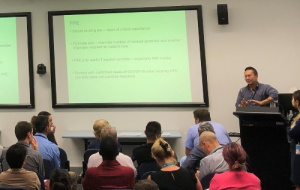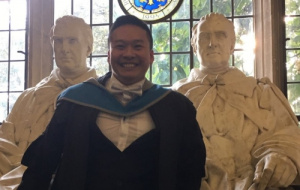COVID-19 in Queensland

Providing a briefing on COVID-19 for medical staff at Redcliffe Hospital in March, just before all workplace meetings went virtual
I am a consultant physician in Infectious Diseases and Respiratory Medicine at Redcliffe Hospital, which is a DGH on the outskirts of Brisbane, the capital of Queensland, Australia. Given my fields of specialisation, I have been extremely busy since January, especially as I am also lead Infectious Diseases physician here.
My hospital has been fortunate in only having had two hospitalised cases so far, reflective of how well Australia, and Queensland in particular, has done in controlling the pandemic. Despite this, there has been a lot of work going on at hospital frontlines and behind the scenes to ensure a well-oiled, coordinated effort. I am a member of my hospital’s COVID-19 Incident Management Team, advising managers and executives on the epidemiological, diagnostic, clinical management, and infection control aspects of COVID-19. In the early stages there were almost daily meetings, which have now been scaled down to weekly.
My phone has also been ringing off the hook for the past few months, with almost every department from Catering to Anaesthetics wanting advice on how best to continue providing the services they do while ensuring minimal risk to staff. This led to lots more meetings (and adjusting to the new normal of online participation), the benefit of which is I now seem to know almost everyone in the hospital by sight, if not by name. However, since SARS-CoV-2 is a novel virus, I had to spend a couple of hours each evening reading the scientific literature and ever-changing public health guidelines to ensure that the advice I was providing was timely and accurate. There was also a lot of external liaison work, such as with the local Public Health Unit and colleagues working in the infection sphere elsewhere.
All this was on top of my usual workload, so I have racked up plenty of overtime and am looking forward to a well-deserved break in the next few months! My situation is not unique – I am an author of a recently published study looking at Australasian Infectious Diseases physician workloads during the COVID-19 pandemic, which showed that my specialty colleagues each worked an average of 41.4 extra hours in February alone. This work was done as part of my contribution to COVID-19-related research, which also includes participation in clinical trials and other studies.
I have been very lucky to have great workmates, who have been receptive to my suggestions and advice, and with whom I have been able to collaborate effectively. I am proud that because we all pulled together, the hospital has been to adapt quickly and continue running smoothly with adherence to good infection control principles. Special credit goes to my Infectious Diseases consultant colleagues and the Infection Control nursing team, without whom I would have burnt out. I am also fortunate to work with executives who listen attentively to the perspectives of clinicians, which is not always the case.
I came down from Univ in 2018 with a MSc in Global Health Science, which has a focus on advanced epidemiology, biostatistics, and clinical trials. I was, thus, able to put into practice these skills almost immediately through conducting the study mentioned above, critically evaluating the literature, as well as assisting with several clinical trials locally. Most significantly, what the COVID-19 pandemic, undertaking the MSc, and my experience as a clinician has taught me is that the opportunity to make the biggest difference in health is not through solely providing patient care and applying current knowledge, important though this is. Rather, it is by discovery of new knowledge and generating solid scientific evidence upon which sound clinical and policy decisions affecting whole populations can be made. I hope, therefore, to go back up next year to undertake a DPhil, which will be my next step towards a career as a clinician-scientist aiming to create an impact globally.
Published: 14 August 2020

